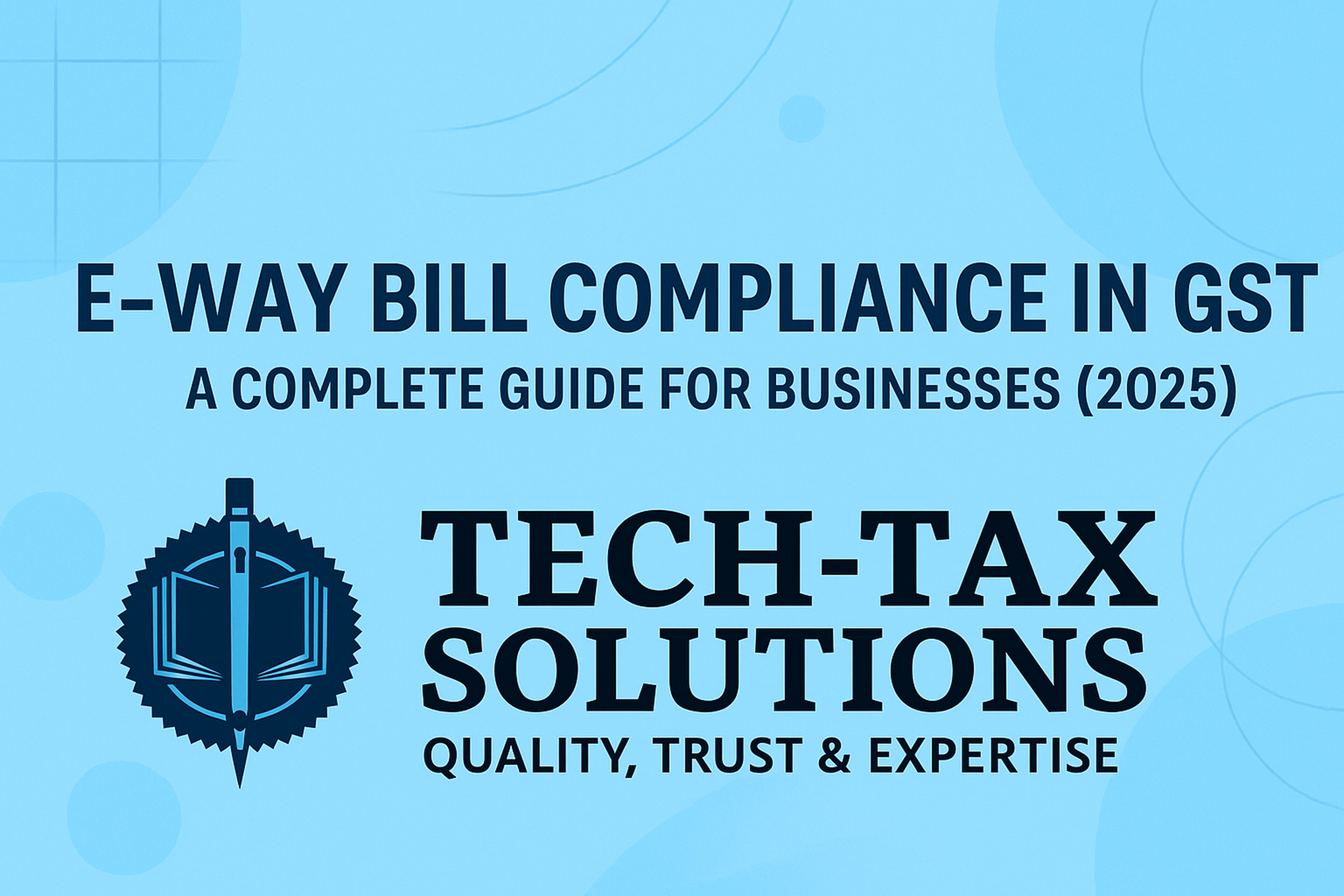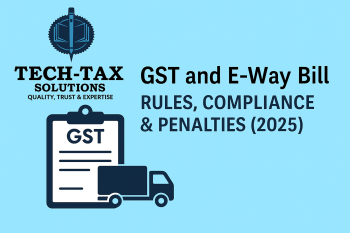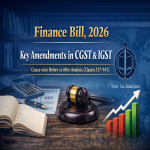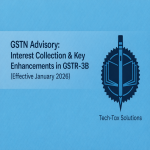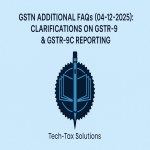🔹 Introduction
Movement of goods under GST is monitored through the E-Way Bill (Electronic Way Bill) system. Introduced under Rule 138 of CGST Rules, it ensures that all goods transported beyond a prescribed value are backed by valid documents. For SMEs, traders, and manufacturers, especially in regions like Ghaziabad, Noida, and Delhi, compliance with E-Way Bill rules is critical to avoid penalties, detention of goods, and disruption of supply chain.
This article provides a detailed law + practical guide to E-Way Bill compliance in 2025.
(References: Rule 138–138E of CGST Rules, Notifications & Circulars updated till 2025)
🔹 What is an E-Way Bill?
-
An electronic document generated on the GST portal before the movement of goods.
-
It serves as evidence that tax has been properly accounted for.
-
Generated in FORM GST EWB-01 consisting of:
-
Part A: Details of consignor, consignee, invoice, value, HSN, etc.
-
Part B: Vehicle/transport details.
-
🔹 When is an E-Way Bill Required?
-
Mandatory if: Value of goods exceeds ₹50,000 (in a single invoice/bill/delivery challan).
-
Applies to:
-
Inter-state and intra-state movement of goods.
-
Supply (sale), return, transfer, job work.
-
Even for non-supply reasons (e.g., exhibitions).
-
⚠️ Special Cases:
-
Inter-state job work: Mandatory even if value < ₹50,000.
-
Handicraft goods: Mandatory irrespective of value.
🔹 Exemptions from E-Way Bill
No E-Way Bill is required for:
-
Goods exempt from GST.
-
Transport by non-motorized vehicles.
-
Goods transported within 10 km (only Part A required).
-
Specific items (e.g., fresh fruits, vegetables, milk, books).
-
Transport by defense formations.
(Refer: Notification No. 12/2018-Central Tax, amended from time to time)
🔹 Step-by-Step Process to Generate E-Way Bill
📌 Step 1: Login
-
Visit ewaybillgst.gov.in
-
Enter GSTIN & OTP
📌 Step 2: Select ‘Generate New’
-
Fill details in Part A:
-
GSTIN of supplier & recipient
-
Invoice/challan number & date
-
HSN code, goods description, value, tax
-
📌 Step 3: Fill Transport Details (Part B)
-
Vehicle number (road)
-
Transport document number (rail/air/ship)
📌 Step 4: Submit
-
System generates a 12-digit E-Way Bill Number (EBN)
📌 Step 5: Share
-
Print/digital copy must accompany goods during transport.
🔹 Validity of E-Way Bill
-
Validity depends on distance travelled:
-
Up to 200 km: 1 day.
-
For every additional 200 km: +1 day.
-
⚠️ Example: A truck from Ghaziabad to Mumbai (~1,400 km) → Validity = 7 days.
-
Extension: Allowed within 8 hours before/after expiry.
🔹 Common Mistakes in E-Way Bill Compliance
-
Mismatch with Invoice → Wrong HSN, value, GSTIN.
-
Expired Validity → Goods detained if validity lapses in transit.
-
Non-generation → Assuming intra-state movement doesn’t require bill.
-
Vehicle change not updated → If transshipment occurs, Part B must be updated.
🔹 Penalties for Non-Compliance
-
Sec. 129 of CGST Act:
-
Goods detained.
-
Penalty = 200% of tax payable.
-
-
Sec. 122:
-
₹10,000 penalty or amount of tax evaded, whichever is higher.
-
⚠️ Example: A trader moving goods worth ₹5 lakh without E-Way Bill → Detention + Penalty ₹90,000 (18% tax × 200%).
🔹 Blocking of E-Way Bill Generation (Rule 138E)
-
If taxpayer fails to file GSTR-3B for 2 months/quarters, E-Way Bill generation is blocked.
-
Can be unblocked by filing pending returns or applying to jurisdictional officer.
🔹 Best Practices for Businesses
-
✅ Train staff on E-Way Bill rules.
-
✅ Always reconcile invoice vs E-Way Bill data.
-
✅ Use mobile app/SMS facility for quick generation.
-
✅ Keep buffer time for long-distance transport.
-
✅ Regularly check E-Way Bill portal for updates.
🔹 FAQs on E-Way Bill
Q1. Is E-Way Bill required for goods below ₹50,000?
➡️ Not mandatory, except for inter-state job work & handicraft goods.
Q2. Can an E-Way Bill be cancelled?
➡️ Yes, within 24 hours if goods not transported.
Q3. What if vehicle breaks down?
➡️ Update new vehicle details in Part B.
Q4. Is E-Way Bill required for services?
➡️ No, only for goods.
Q5. Can multiple invoices be clubbed in one E-Way Bill?
➡️ No, separate bill for each invoice. But consolidated E-Way Bill can be generated.
🔹 Conclusion
The E-Way Bill system is a backbone of GST compliance. Mistakes like expired validity, mismatched invoices, or failure to generate can result in heavy penalties. With proper planning and technology tools, businesses can ensure seamless compliance.
📌 Need expert help with E-Way Bill compliance, GST returns, or departmental issues?
Contact Tech-Tax Solutions – Quality, Trust & Expertise in Ghaziabad, Noida & Delhi.
